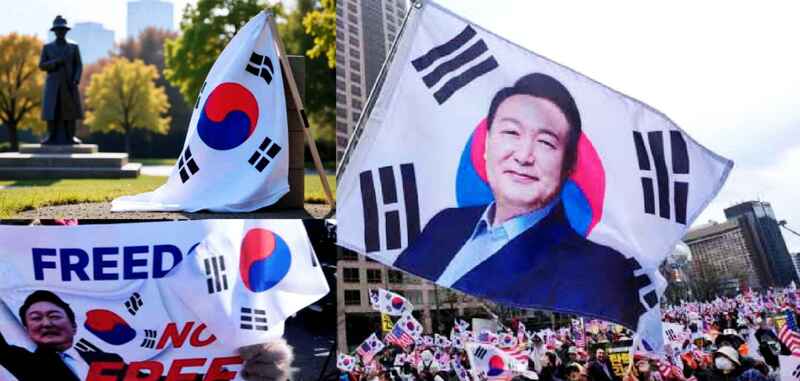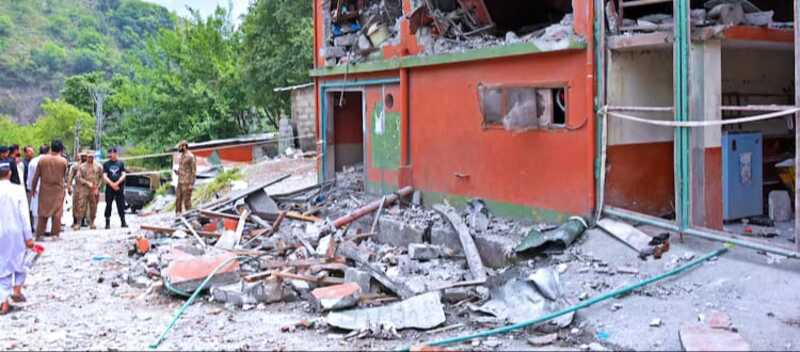 People protest on South Korea's President Yoon Suk Yeol Impeachment. Photo Credits: AP/EPA-EFE/Pixabay
People protest on South Korea's President Yoon Suk Yeol Impeachment. Photo Credits: AP/EPA-EFE/Pixabay
South Korea’s Martial Law Crisis: Political Unrest, Impeachment Battles, And Democratic Survival Of President Yoon
Martial law, the temporary imposition of military control over civilian government functions, often raises concerns about civil liberties, concentration of power, and human rights abuses. In South Korea, President Yoon Suk Yeol’s declaration of martial law in late 2024 triggered an unprecedented political crisis, shaking the nation’s democratic foundations.
The Crisis Unfolds
In December 2024, President Yoon declared martial law, citing threats to national security amid mounting opposition from the National Assembly. This move faced fierce resistance from opposition parties, activists, and the public, who viewed it as an attempt to consolidate power. The National Assembly swiftly moved to impeach Yoon, marking only the second impeachment of a sitting president in South Korea’s history.
Following Yoon’s impeachment, Prime Minister Han Duck-soo assumed the role of acting president but was impeached shortly after. This left Finance Minister Choi Sang-mak next in line for leadership, further deepening the nation’s instability.
Nationwide Protests and Divided Opinions
Massive rallies erupted across South Korea, with supporters of Yoon arguing that his actions were necessary to curb anti-state activities, while critics accused him of an authoritarian power grab. Protesters in Seoul and other major cities demanded a resolution to the crisis and the restoration of democratic order.
Legal and Political Fallout
As the Constitutional Court deliberates on Yoon’s impeachment, other high-ranking officials face legal scrutiny. Former Defense Minister Kim Yong-hyun is on trial for alleged insurrection related to the martial law decree, denying any wrongdoing. Meanwhile, the United States has classified South Korea as a “sensitive” country, potentially impacting bilateral relations and cooperation in sectors like energy and technology.
Uncertain Future
As of March 2025, the crisis remains unresolved. The Constitutional Court continues to review Yoon’s impeachment, with arguments on whether his actions violated the constitution. If the court rules against Yoon, a new presidential election may be scheduled within months. If reinstated, South Korea could face further unrest as opposition groups vow to continue protests.
The Democratic Party has introduced a motion to impeach Acting President Choi Sang-mok, accusing him of obstructing judicial appointments and vetoing key legislation. If this impeachment proceeds, South Korea risks another leadership vacuum, exacerbating instability.
Economic and International Implications
Economic uncertainty looms as foreign investors express concerns over the prolonged crisis. The South Korean won has fluctuated amid political instability, while relations with the United States and China remain under scrutiny as both powers monitor South Korea’s shifting political landscape.
At a Crossroads
South Korea’s democratic resilience is being tested as the nation grapples with leadership turmoil and public discontent. The resolution of this crisis will shape the country’s political landscape, governance, and international reputation for years to come. As the world watches, South Korea must navigate these turbulent times while preserving its democratic integrity and ensuring a stable future.
The Crisis Unfolds
In December 2024, President Yoon declared martial law, citing threats to national security amid mounting opposition from the National Assembly. This move faced fierce resistance from opposition parties, activists, and the public, who viewed it as an attempt to consolidate power. The National Assembly swiftly moved to impeach Yoon, marking only the second impeachment of a sitting president in South Korea’s history.
Following Yoon’s impeachment, Prime Minister Han Duck-soo assumed the role of acting president but was impeached shortly after. This left Finance Minister Choi Sang-mak next in line for leadership, further deepening the nation’s instability.
Nationwide Protests and Divided Opinions
Massive rallies erupted across South Korea, with supporters of Yoon arguing that his actions were necessary to curb anti-state activities, while critics accused him of an authoritarian power grab. Protesters in Seoul and other major cities demanded a resolution to the crisis and the restoration of democratic order.
Legal and Political Fallout
As the Constitutional Court deliberates on Yoon’s impeachment, other high-ranking officials face legal scrutiny. Former Defense Minister Kim Yong-hyun is on trial for alleged insurrection related to the martial law decree, denying any wrongdoing. Meanwhile, the United States has classified South Korea as a “sensitive” country, potentially impacting bilateral relations and cooperation in sectors like energy and technology.
Uncertain Future
As of March 2025, the crisis remains unresolved. The Constitutional Court continues to review Yoon’s impeachment, with arguments on whether his actions violated the constitution. If the court rules against Yoon, a new presidential election may be scheduled within months. If reinstated, South Korea could face further unrest as opposition groups vow to continue protests.
The Democratic Party has introduced a motion to impeach Acting President Choi Sang-mok, accusing him of obstructing judicial appointments and vetoing key legislation. If this impeachment proceeds, South Korea risks another leadership vacuum, exacerbating instability.
Economic and International Implications
Economic uncertainty looms as foreign investors express concerns over the prolonged crisis. The South Korean won has fluctuated amid political instability, while relations with the United States and China remain under scrutiny as both powers monitor South Korea’s shifting political landscape.
At a Crossroads
South Korea’s democratic resilience is being tested as the nation grapples with leadership turmoil and public discontent. The resolution of this crisis will shape the country’s political landscape, governance, and international reputation for years to come. As the world watches, South Korea must navigate these turbulent times while preserving its democratic integrity and ensuring a stable future.
Senior Editor: Kenneth Njoroge
Financial Expert/Bsc. Commerce/CPA

